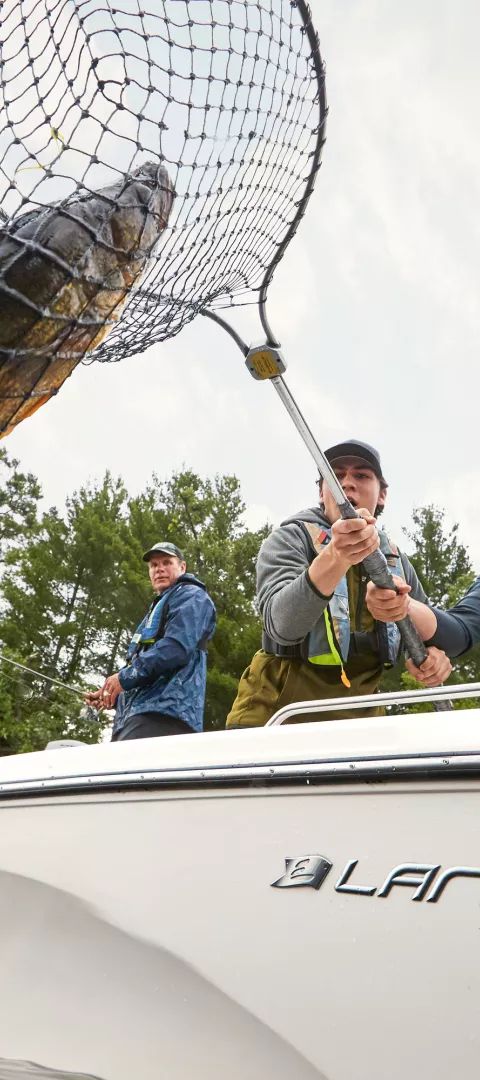
Where to Go Fishing in Minnesota
Where to Go Fishing in Minnesota
Seeing as how we live in the Land of 10,000 Lakes, there's no shortage of fishing options and fresh catches in nearly every corner of Minnesota. The following guide breaks down the very best in every region, along with all the resorts, lodges and worthwhile stops you'll see along the way.

Sportsman's Oak Island at Lake of the Woods
NORTHWEST
In Northwest Minnesota, the Mississippi River begins its journey as a wilderness stream, winding through pine and hardwood forests studded with thousands of large and small lakes alive with bass, panfish, walleye, northern pike, muskie and more. Along the western border, the Red River of the North travels up toward Canada along the western border of the state, producing many of the above species as well as huge channel catfish. The diversity of waters leads to a great diversity of fishing experiences.
Big Waters
The broad, fertile waters of Lake of the Woods, Leech Lake, Lake Winnibigoshish and Upper Red Lake draw serious anglers from across the nation, particularly for big northern pike and walleye, which find perfect breeding grounds on the lakes’ windswept reefs and shorelines. Anglers take to the big water in deep-V boats, jigging the flats and drop-offs, or trolling the reefs with crankbaits. Commercial launches, popular on Leech and Lake of the Woods, are an easy and economical way to get out on these big waters. There's also excellent fishing on Lake of the Woods among the sheltered islands off the Northwest Angle, the northernmost point of Minnesota.
Leech Lake is fabled for its notorious muskie "rampage," a few midsummer days when muskies hit just about anything in the water. Cass Lake has also been a top producer of big muskies. Lake Winnibigoshish is a large reservoir with 140 miles of mostly undeveloped shoreline. Called "Winnie" by its fans, the lake holds walleye, northerns, muskies and perch. Adjoining Winnie is Cut Foot Sioux Lake, and nearby are Bowstring and Ball Club lakes.

Sunset fishing in Bemidji / Brady Laudon (Courtesy of Visit Bemidji)
North Woods Lakes
The big lakes are best known, but hundreds of smaller lakes rank among the favorites of those who fish them. They hold almost every kind of game fish Minnesota offers: walleyes, largemouth and smallmouth bass, pike, muskies, sunfish and crappies.
Among these are Detroit Lake and Lake Bemidji, the latter anchoring a popular state park across the lake from the town of Bemidji. These and several others have become muskie hot spots through carefully managed stocking programs. But the region's popular lakes are favored for their variety and the options they offer anglers. Near the town of Detroit Lakes are Cormorant, Melissa and Pelican lakes; Plantagenet and Blackduck lakes are near Bemidji. Not far from Park Rapids are Big Sand and Fish Hook lakes. All make good fishing destinations, as do others too numerous to name.
River Fishing
Northern Minnesota also has some red-hot river fishing. Float the Mississippi in a boat or canoe and catch everything from muskies to smallmouth bass. The river arcs through the north woods linking several large reservoirs. The Red River of the North, hugging the state's western border, flows through a rural landscape into Canada. It’s the northernmost catfish population in the state, giving up channel cats averaging well over 10 pounds. The Red Lake River also features a variety of fish.
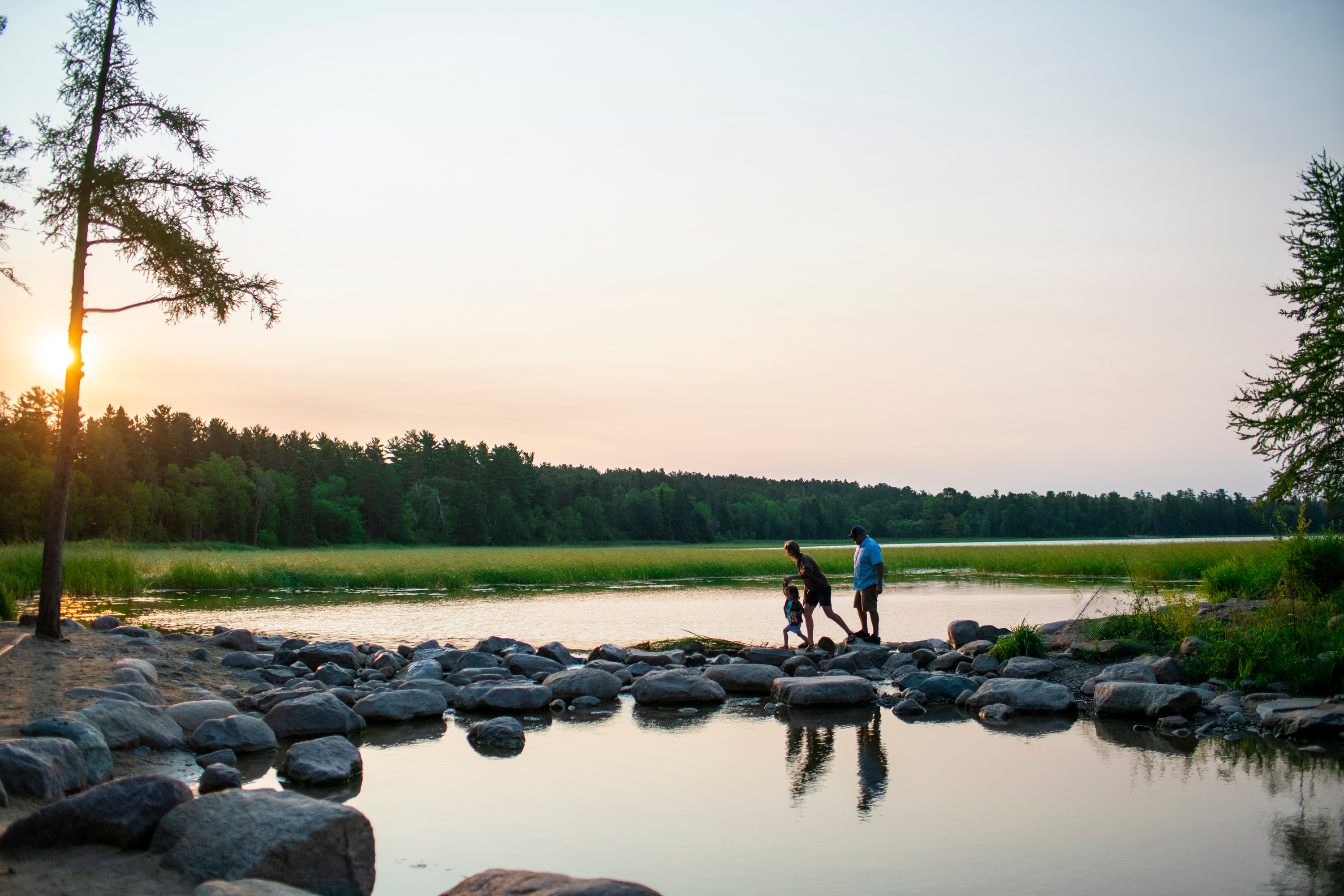
The headwaters at Itasca State Park / Kvidt Creative
Things to Do While You're Here
There's more here than just big lakes and big fish. A must-see highlight of this area is the headwaters of the Mississippi River at Itasca State Park. If you enjoy gaming, there are several Ojibwe-owned casinos in the area. Towns such as Detroit Lakes, Park Rapids, Bemidji and Walker feature charming small-town shopping, dining, plus hundreds of small lakeside resorts and campgrounds.
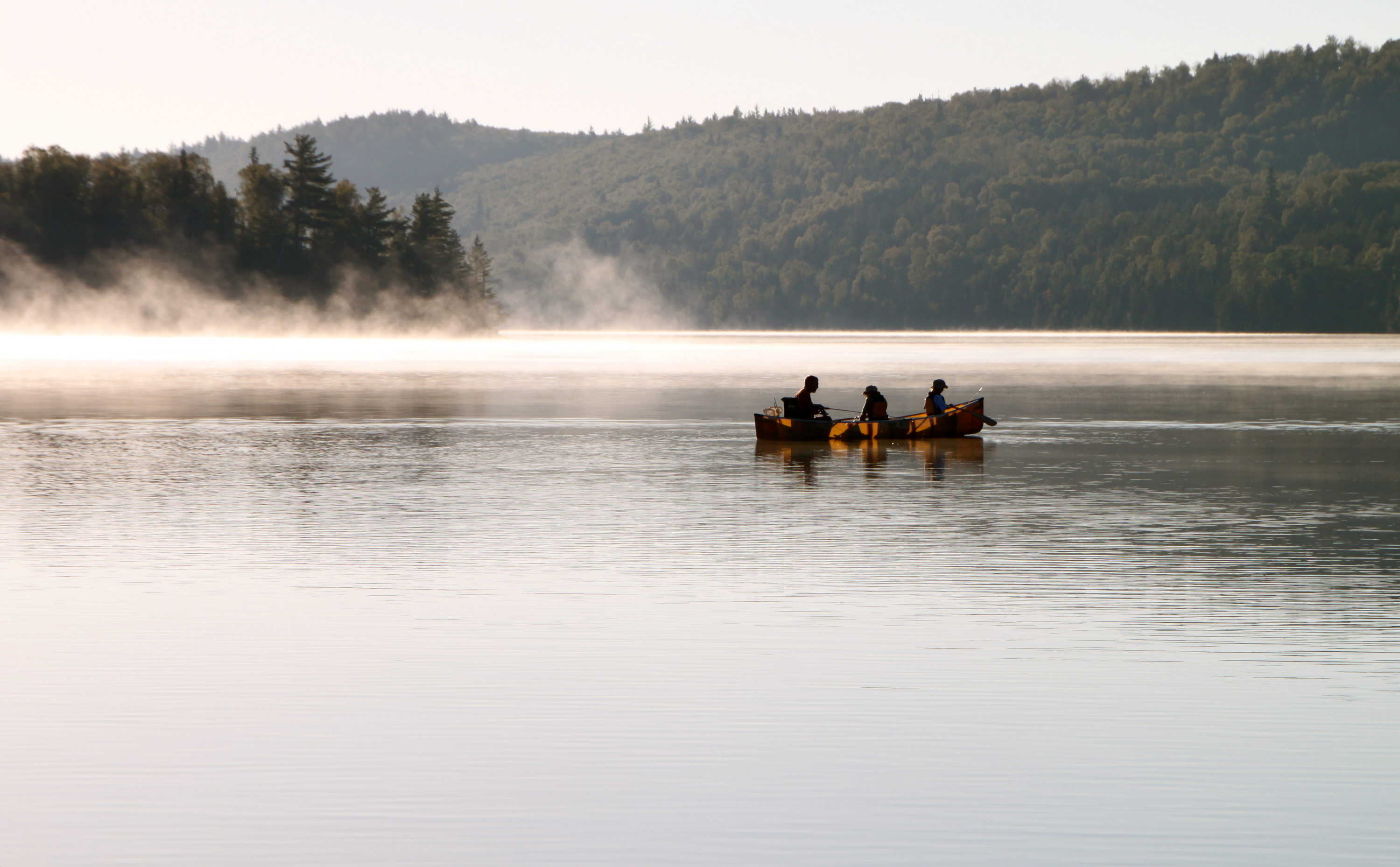
Fishing in the Boundary Waters Canoe Area Wilderness / Cheri Beatty
NORTHEAST
This corner of Minnesota has been dubbed the "Arrowhead" for its distinctive shape, formed by the Canadian border on one side and the craggy shore of Lake Superior on the other. In between is a wild land with deep forests of pine and birch dotted with thousands of lakes, where wolves still howl and loons call out across the water.
Wilderness Waters
The Boundary Waters Canoe Area Wilderness (BWCAW) holds more than 1,000 lakes linked by overland trails. Most lakes are paddle-only; motors are permitted on only a few. BWCAW visitors canoe to secluded campsites and fish for trophy walleye, northern pike and some of the finest top-water smallmouth bass fishing in the nation. In early spring, the deepest lakes provide light-tackle fishing for lake trout. Major gateways to this canoe country are Ely and the Gunflint Trail, a scenic byway that begins in Grand Marais.
Also along the state's northern border is Voyageurs National Park, just east of International Falls. Voyageurs has beautiful rocky lakes, thick forest and great fishing. Travel is largely by motorboat; rent one from an area resort, or book a comfortable houseboat, the largest of which accommodate up to 12 people. Rainy, Kabetogama, Namakan, Crane and Sand Point lakes serve up walleyes, northerns, smallmouth bass and big crappies. Just west, anglers fish the Rainy River for walleyes, pike and sturgeon.

A Pelican Lake sunset / Michael Harthan
Lake Country
Along the Iron Range, from Grand Rapids to Babbitt, abandoned mine pits have filled with clear spring water, forming lakes such as Lake Ore-be-Gone, now holding trout and big pike. The area is rich with natural lakes as well, some of which are managed for trout.
Long and narrow Birch Lake near Babbitt has great fishing for a variety of species, and is a favorite for houseboat rental. The island-studded beauty of Lake Vermilion is enhanced by its budding reputation for big muskies, as well as large perch, walleye and bluegills. In the north woods between the Iron Range and Voyageurs, Pelican Lake near Orr has a lot of shallow structure for great fishing.
The forests around Grand Rapids are studded with lakes. North of town, the Edge of the Wilderness Scenic Byway winds among scores of lakes in Chippewa National Forest, including Trout Lake and Lake Wabana. Here is a place to fish walleyes, pike and bass in solitude. Just southwest of Grand Rapids is popular Pokegama Lake.

Winter fishing at Two Harbors Lighthouse on Lake Superior / Kunal Garde
Lake Superior
The Arrowhead borders the largest freshwater lake in the world. Lake Superior's cold, clear waters hold native lake trout, and stocked steelhead, chinook and coho salmon. The big lake is too open and windswept for many smaller boats, but charter fishing trips are available from Duluth and other towns along the North Shore.
Stream & River Fishing
Stream fishing is also popular along the North Shore. In the thundering wilderness rivers that tumble into Lake Superior, anglers wade in to cast for resident trout, or drift-fish for spawning steelhead during their spring run. The St. Louis River near Duluth is a favorite for walleye, smallmouth bass and muskie. The St. Croix, a National Scenic River, is a great route to canoe and fish for smallmouth bass, northern pike and walleyes.

The staircase inside Split Rock Lighthouse / Jayme Larson
THINGS TO DO WHILE YOU'RE HERE
Among the top attractions in this area are many state parks, waterfalls and Split Rock Lighthouse along the North Shore, and the International Wolf Center and North American Bear Center in Ely. The Commercial Fishing Museum in Tofte and the Great Lakes Aquarium in Duluth might be of special interest to anglers. Several of the state's top golf courses are in this region.

Basking in the fall colors on Crosslake / Micah Kvidt
CENTRAL
This is lake country, where the hardwoods of the south meet the pine forests of the north, and the rural countryside holds hundreds of lakes populated with a variety of fish. It's a great family vacation destination, with much to do off and on the water.
Legendary Lakes
Located in the heart of the state, the Brainerd Lakes area has been a fishing destination for travelers for more than a century, and is home to fishing legends Babe Winkelman and Al Lindner, and In-Fisherman magazine. Tall tales of giant lumberjack Paul Bunyan say the lakes here sprang up to fill the footprints of his sidekick, Babe the Blue Ox. Among the bounty of good fishing lakes are Gull, Pelican, Whitefish, North Long and Round.
An unusual fishery has developed in the abandoned iron-ore mines of the Cuyuna Iron Range near Crosby, just northwest of Brainerd. Many of these deep open pits have filled with spring water and are now stocked with trout; some also harbor monster pike and smallmouth bass.
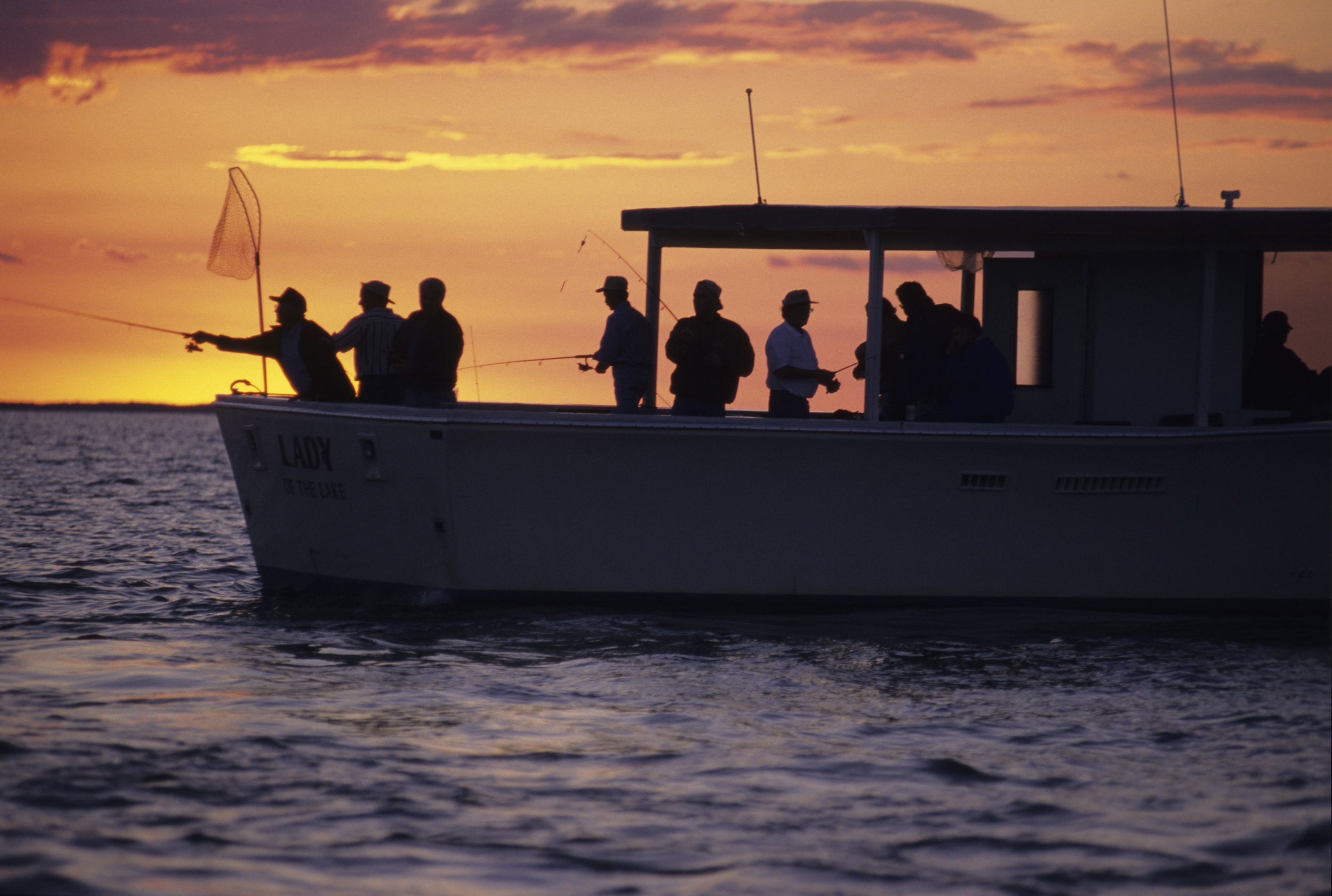
Fishing at sunset from one of many launch boats on Mille Lacs Lake / www.millelacs.com
Mille Lacs Lake, east of Brainerd, is the second largest lake within Minnesota and a popular fishing destination. Mille Lacs offers great fishing for smallmouth bass, muskies, walleyes, perch, northern pike and other species. Fishing launches large and small make it easy to get out on this big lake, providing bait, tackle and guidance on half- or full-day trips.
In the Aitkin-McGregor area north of Mille Lacs, several smaller lakes, including Big Sandy, Round and Minnewawa, are popular spots for walleyes, pike, largemouth bass and panfish. Cedar Lake is known for muskies.

The sun sets over Green Lake
Central Lakes
The Central Lakes area in the rural countryside south of St. Cloud serves up good fishing, too. Popular lakes are Rice, Koronis, Clearwater, Cedar, Sylvia and Pleasant, with a few resorts in the Paynesville area. There is another large cluster of lakes in the countryside around Willmar, including Big Kandiyohi south of town.
One of the best is Green Lake near Spicer. A clear lake amid glacial hills, Green provides fishing for walleyes, northern pike, bass and panfish that compares favorably with most northern lakes. There are several lakeside resorts in the Spicer-New London area.

The Minnesota Lakes Maritime Museum in Alexandria
Glacial Lakes
In the rolling countryside surrounding Alexandria and Fergus Falls, many glacial lakes dot the green hills. More than 1,000 lakes fall within the boundaries of Otter Tail County alone, including Otter Tail and Clitherall near Fergus Falls. Other well-known glacial lakes include Lake Minnewaska next to Glenwood, and Le Homme Dieu, Carlos, Darling, Ida and Osakis near Alexandria. These lakes offer a variety of species, from panfish to walleye.
Several lakes have become muskie hot spots through carefully managed stocking programs. Among these are Lake Miltona north of Alexandria and West Battle Lake in Otter Tail County.
THINGS TO DO WHILE YOU'RE HERE
This region has hundreds of resorts, from classic lakeside cabins to large, full-service resorts with restaurants, golf courses, spas and water parks. The Brainerd Lakes area boasts excellent golf courses. See antique fishing gear at the Minnesota Fishing Museum in Little Falls and antique boats at the Minnesota Lakes Maritime Museum in Alexandria. Cycle for miles on picturesque paved trails such as the Central Lakes State Trail, Glacial Lakes State Trail and Lake Wobegon Regional Trail.
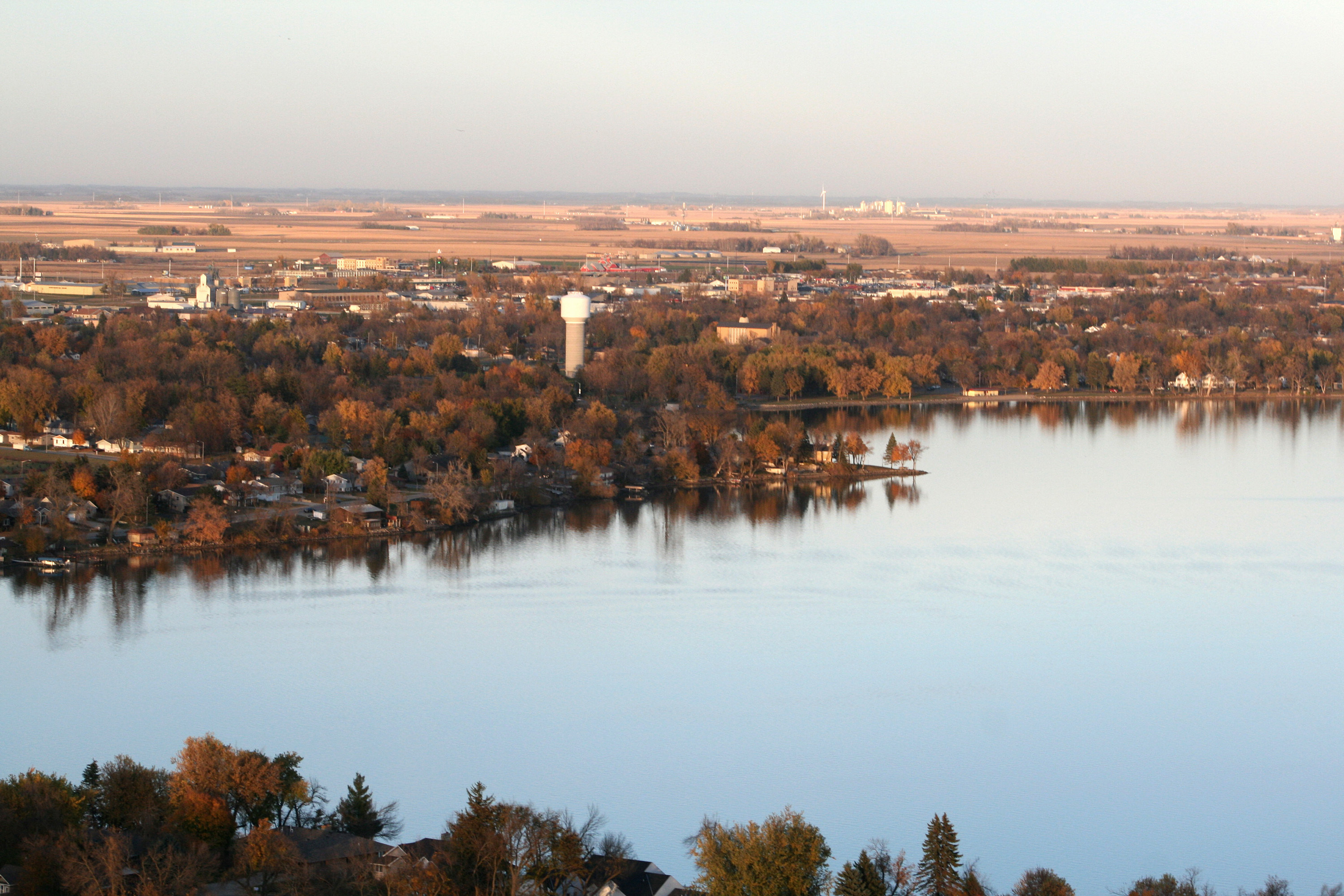
An aerial view of Lake Okabena
SOUTHERN
Savvy anglers know that the countryside of southern Minnesota holds some surprisingly good fishing lakes and rivers, as well as scenic and productive trout streams. These waters can make for a quick and easy fishing getaway.
Southern Lakes
Many of the large lakes in the rolling farmland and valleys of the south are regularly stocked with walleyes. Most also have northern pike, largemouth bass and panfish. Some offer up dandy channel cats. And nearly every lake and pond down here has bullheads, perhaps the most popular fish in the region, celebrated at an annual festival in Waterville. Catching them is easy—all you need is a pole, line, hook and worm.
The rural landscape between Mankato and Faribault is splashed with numerous lakes, several of which are popular fishing waters, served by a handful of resorts in the area. Among the fishing lakes to try here are Tetonka near Waterville; Madison and Washington east of Mankato; Mazaska, Shields and Roberds near Faribault.
Some of the best and most popular of the prairie lakes farther south include Benton and Shaokotan west of Marshall, Okabena at Worthington, Lake Hanska south of New Ulm, and Budd, Sisseton and Hall near Fairmont. Farther east is Albert Lea Lake, at its namesake town.

Go sailing on Lake Pepin in southern Minnesota / Roy Son
Minnesota & Mississippi Rivers
As good as the fishing is in southern Minnesota's lakes, the biggest fish in the region come from the rivers and streams. The Minnesota River and major tributaries hold some monstrous flathead catfish. Drop a live minnow into a logjam on an outside river bend some evening, and you may soon find yourself wrestling a flathead over 30 pounds. Other game fish on the river include walleyes, saugers and channel cats. Try for walleyes at Big Stone Lake, at the headwaters of the Minnesota River near Ortonville.
In the southeast, the Mississippi River, nestled between steep wooded bluffs, provides the main action. Its fishing is as impressive as the scenery, with walleyes, saugers, smallmouth bass and catfish. One of the most popular fishing holes is Lake Pepin, a great widening of the river. White bass are also common in the lake, and when schools smash baitfish at the surface, fishing can be furious. The tangled backwaters hold some big northern pike and good panfish.

The National Eagle Center in Wabasha
Trout Streams
The spring-fed streams that riffle through the bluff country in the far southeastern corner of the state offer Minnesota's best trout fishing. Brown trout of two pounds and larger live in large streams such as the Whitewater and upper reaches of the Root, as well as clear tributaries so small you can leap across. The streams wind through valleys of hardwood forest. Fly fishermen love these streams for their beautiful surroundings, plentiful trout and frequent aquatic insect hatches.
THINGS TO DO WHILE YOU'RE HERE
Visitors have a wide choice of campgrounds or hotels, some country resorts, and several historic inns and B&Bs. Favorite activities in this area include antique shopping, visiting historic sites and biking the region's scenic paved trails. Among the area's many attractions are the National Eagle Center in Wabasha, historic Schell's Brewery in New Ulm and the National Trout Learning Center in Preston.

Lake Minnetonka at sunset / Rob Young
MINNEAPOLIS-ST. PAUL AREA
If you're staying in the Minneapolis-St. Paul area, good fishing is within casting distance. Big smallmouth, walleyes and catfish swim in the Mississippi River where it passes through downtown Minneapolis and St. Paul. Angling for walleye and sauger is popular on the St. Croix River in the eastern part of the metro area. The Minnesota River just south of the Twin Cities is another good bet. In the area’s lakes, you can catch muskies, walleye and largemouth bass over five pounds.
Extend your range just a few miles and you're within reach of some of the best fishing in the state. Lake Minnetonka and Lake Waconia, both west of Minneapolis, have long had the reputation as great bass lakes, and now they have muskies, too.
About 30 Twin Cities area lakes are stocked with pure-strain muskies or hybrid tiger muskies. Among the best are White Bear, Bald Eagle and Independence. Many lakes have walleyes, northern pike, bass and panfish. Among the most popular are the lakes of Chisago County, at the northeast edge of the metro area, including Green, Chisago, North Center and South Lindstrom lakes.
Minnesota has made special efforts to give city anglers opportunities to go fishing, even if they don't have a boat, or even a car. The Fishing in the Neighborhood (FiN) Program stocks fish, installs fishing piers, puts on fishing clinics, and identifies dozens of metro-area lakes and rivers that provide good fishing in a safe setting suitable for families. Many FiN facilities are reachable by bus and are wheelchair-accessible. Learn more about the program and area fishing opportunities over at the official Department of Natural Resources site.

SEA LIFE is Mall of America's underground aquarium
THINGS TO DO WHILE YOU'RE HERE
Visitors will find upscale lodging, dining and award-winning theater, all in an area with dozens of parks, trails and green space including the Mississippi National River and Recreation Area, a national park site that boasts 72 miles of public riverfront. Shopping is plentiful in Bloomington’s Mall of America, downtown Minneapolis, St. Paul’s Grand Avenue, Stillwater and elsewhere throughout the area.
Find out more about fishing in Minnesota.

